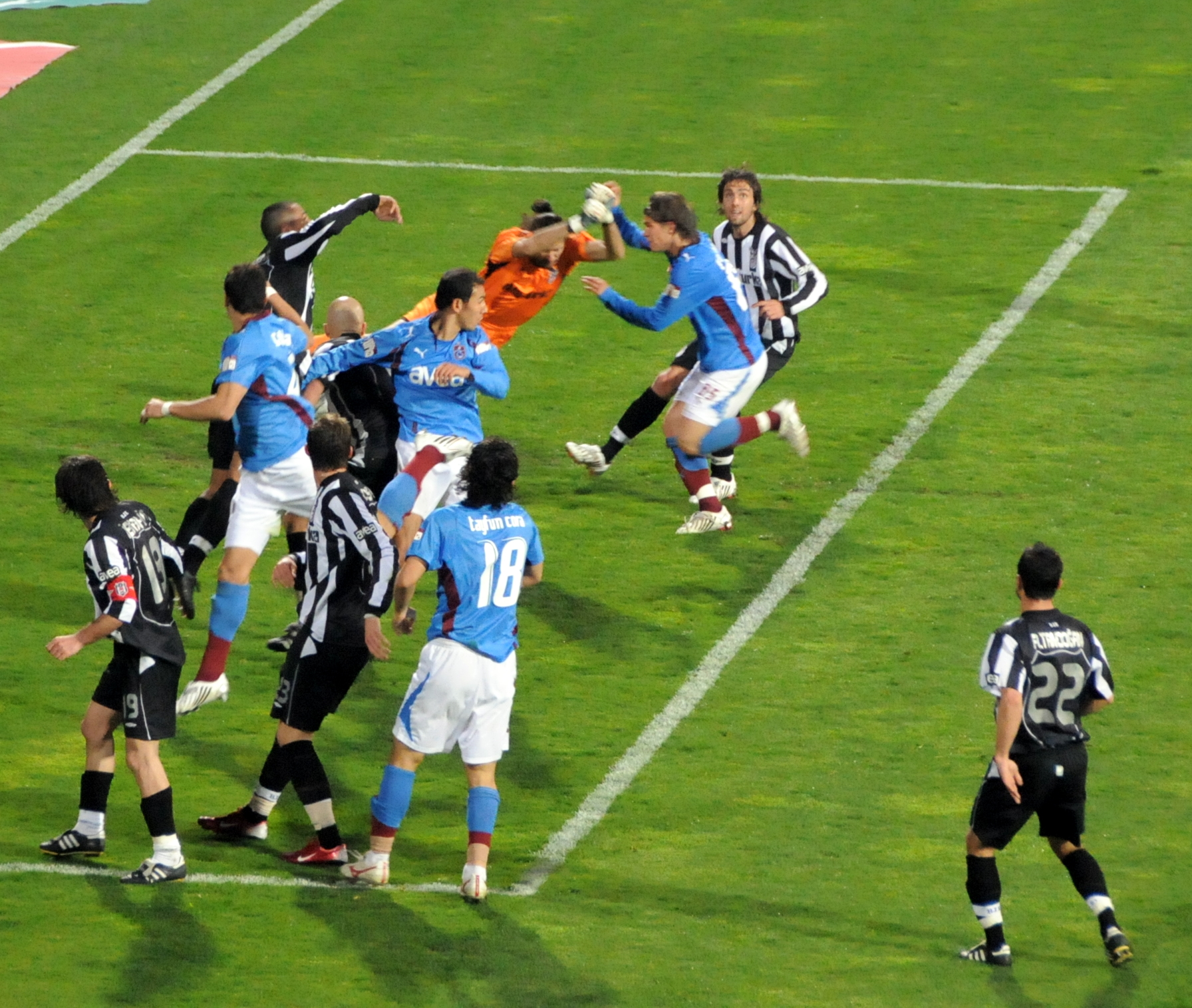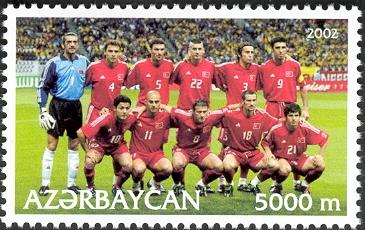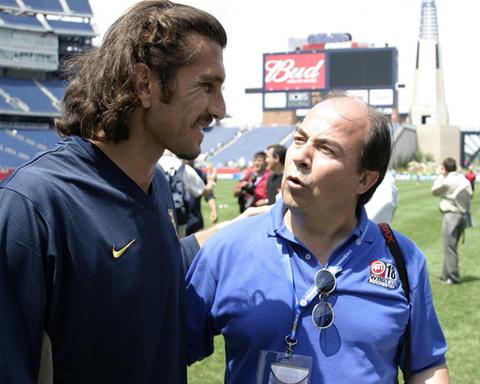1. Early life and career beginnings
Rüştü Reçber's early life and educational background led him to an unexpected path in football, transitioning to a goalkeeper, before his professional career began with his debut at a local club and subsequent moves that shaped his talent.
1.1. Childhood and education
Born in Korkuteli, Antalya, Turkey, Rüştü initially played as a right winger during his youth. At the age of 17, his coach suggested he try playing as a goalkeeper due to his height, a position he then converted to. This decision proved to be a turning point in his career. In 1992, after his debut for the Turkey under-21 team, national manager Fatih Terim recognized Rüştü's immense potential, telling him that he would eventually become the greatest goalkeeper in the nation's history. Despite his future allegiance to Fenerbahçe, Rüştü was a supporter of Galatasaray in his childhood.
1.2. Entry into professional football
Rüştü began his professional career in 1990 by joining Burdurgücü, where he made one league appearance. After one season, he moved to his local club, Antalyaspor. His talent quickly caught the attention of larger clubs, but early opportunities with Istanbul's Big Three clubs were missed. At 17, he declined an offer from Galatasaray because coach Mustafa Denizli wanted him to start in the youth team. In 1993, a planned move to Beşiktaş fell through when he sustained a serious injury in a car crash shortly after signing a contract with them.
In 1993, Rüştü signed with Fenerbahçe, the last of the Big Three. However, for his first season under contract with Fenerbahçe, he was loaned back to Antalyaspor, where he continued to develop his skills. He made 33 appearances for Antalyaspor during this loan spell. His significant professional break came in October 1994, during his first season back at Fenerbahçe, when the club's and national team's starting goalkeeper, Engin İpekoğlu, suffered a foot injury against Kayserispor. This allowed Rüştü to make his Fenerbahçe debut against Petrol Ofisi, marking the true beginning of his prominent club career.
2. Club career
Rüştü Reçber's club career spanned over two decades, marked by his impactful stints with Antalyaspor, multiple successful periods with Fenerbahçe, a challenging but notable spell at FC Barcelona, and a final victorious phase with Beşiktaş.
2.1. Antalyaspor (1991-1994)
After his initial professional experience at Burdurgücü, Rüştü joined his hometown club, Antalyaspor, in 1991. He spent three seasons with Antalyaspor, developing his skills and gaining crucial experience in the lower divisions of Turkish football. During the 1993-94 season, after signing with Fenerbahçe, he was loaned back to Antalyaspor for a full season, making 33 appearances. This period was instrumental in his growth as a goalkeeper before he established himself at a top-tier club.
2.2. Fenerbahçe (1994-2003)
Rüştü's first tenure at Fenerbahçe began effectively in October 1994, following an injury to the club's starting goalkeeper. He quickly established himself as a key player and eventually became the team captain. Over this nine-year period, he made 240 league appearances. During this highly successful spell, he won the Süper Lig title twice, in the 1995-96 and 2000-01 seasons. He also secured the Atatürk Cup in 1998, further cementing his status as a club legend. His consistent performances and leadership made him an indispensable part of Fenerbahçe's success during this era.
2.3. FC Barcelona (2003-2004)
In July 2003, Rüştü was close to signing with Arsenal, but a dispute with manager Arsène Wenger over his fitness led him to instead join La Liga club FC Barcelona. His time at Barcelona, however, was brief and challenging. Manager Frank Rijkaard chose to play Víctor Valdés in the first two league matches because Rüştü's Spanish was still very weak. Rüştü openly expressed his frustration with this decision, stating, "It is not normal for a goalkeeper of my history and caliber to be left out because I don't speak Spanish."
Despite his initial disappointment, Rüştü made his debut for Barcelona on October 15, 2003, in a UEFA Cup first-round second leg match against MŠK Púchov, which Barcelona won 8-0. His first league appearance came on December 13, 2003, in a 3-1 win against Espanyol in the Derbi barceloní, a match notable for six expulsions and significant incidents in the stands. In total, Rüştü made only seven appearances for Barcelona across all competitions during the 2003-04 season, including four in the league. His limited playing opportunities led to his return to Turkey.
2.4. Return to Fenerbahçe (2004-2007)
Following his brief spell at FC Barcelona, Rüştü was loaned back to Fenerbahçe on August 27, 2004, for the remainder of the season. His loan was then extended for another year on July 28, 2005. During this second period with Fenerbahçe, which included the 2006-07 season after his loan spells, Rüştü continued to contribute to the team's success. He secured his third and fourth Süper Lig titles with Fenerbahçe in the 2004-05 and 2006-07 seasons. Across both of his tenures, Rüştü made 294 appearances for Fenerbahçe, making him the goalkeeper with the second-highest number of appearances for the club, only behind Volkan Demirel. Despite winning the league in his final season, he faced competition for the starting spot from Volkan Demirel, which led to his eventual departure.
2.5. Beşiktaş (2007-2012)
After winning his third league title with Fenerbahçe in the 2006-07 season, Rüştü moved to city rivals Beşiktaş on a three-year deal, along with teammate Mehmet Yozgatlı. This move generated considerable reaction from Fenerbahçe fans. At Beşiktaş, he continued to showcase strong performances, despite periodically struggling with injuries.
He achieved further success with Beşiktaş, winning the Süper Lig title for the fifth time in his career during the 2008-09 season. Additionally, he played a crucial role in Beşiktaş's victories in the Turkish Cup, securing titles in the 2008-09 and 2010-11 seasons. In the 2010-11 Turkish Cup final, he played all 120 minutes of the match, including the penalty shootout, contributing significantly to the club's triumph. Rüştü retired from professional football in 2012 after five seasons with Beşiktaş, marking the end of a highly successful club career.

3. International career
Rüştü Reçber's international career was long and decorated, with his performances in major tournaments playing a crucial role in Turkey's most significant achievements on the world stage.
3.1. Early international career
Rüştü made his debut for the Turkish national team in 1994, playing against Iceland. From that point onward, he solidified his position as the primary goalkeeper for the national team. He consistently represented Turkey in major international competitions, including UEFA Euro 1996 and UEFA Euro 2000, gaining valuable experience on the European stage. On March 26, 2005, Rüştü earned his 100th international cap in a 2-0 home victory over Albania during the 2006 FIFA World Cup qualification campaign, a testament to his long-standing presence and importance to the national team.
3.2. 2002 FIFA World Cup
The 2002 FIFA World Cup in South Korea and Japan was arguably the pinnacle of Rüştü's international career. He played a pivotal role in leading Turkey to an unexpected third-place finish, the nation's best performance in the tournament's history. Rüştü played in all seven of Turkey's fixtures, conceding only six goals throughout the tournament. His exceptional goalkeeping performances were widely recognized, and he was selected as one of the two goalkeepers in the 16-man Team of the Tournament, alongside Germany's Oliver Kahn. This recognition underscored his status as one of the world's elite goalkeepers at the time.

3.3. UEFA Euro 2008
At UEFA Euro 2008, Rüştü Reçber played a crucial role in Turkey's historic run to the semi-finals, despite starting the tournament as the second-choice goalkeeper behind Volkan Demirel. He stepped in as the starting goalkeeper for the quarter-final match against Croatia after Volkan Demirel received a suspension.
In the match against Croatia, Rüştü made a questionable foray from his goalmouth, allowing Croatia to score the opening goal with just a minute remaining in extra time. However, he immediately redeemed himself by assisting Semih Şentürk's equalizer in the 122nd minute of injury time, sending the game to a penalty shootout. In the ensuing shootout, Rüştü displayed heroic penalty-stopping prowess, saving the crucial last kick from Mladen Petrić to secure Turkey's victory and their first-ever progression to the Euro semi-finals. He then captained the team in the semi-final against Germany, which Turkey ultimately lost 3-2. His performance against Croatia, particularly his composure and saves in the shootout, is remembered as one of the defining moments of the tournament for Turkey.
3.4. National team retirement
In the aftermath of Turkey's 3-2 semi-final loss to Germany at UEFA Euro 2008, a game in which he served as captain, Rüştü announced his retirement from international football. However, he later reversed this decision and was called up again, notably for a 2010 FIFA World Cup qualifying match against Spain. His final appearance for the national team came on May 26, 2012, in a friendly match against Finland, which marked his 120th and last international cap, solidifying his record as Turkey's most-capped player.
4. Style of play and characteristics
Rüştü Reçber was renowned for his distinctive playing style and impressive technical attributes as a goalkeeper, combined with a charismatic presence that made him a fan favorite. Standing at 6.1 ft (1.87 m), he was widely regarded as a gifted shot-stopper with an excellent positional sense, allowing him to anticipate and react effectively to shots. His height also enabled him to adeptly come out for high balls and command his penalty area.
Rüştü possessed strong reflexes and good deflecting ability, often turning powerful shots away from danger. He was particularly known as a formidable penalty stopper; his performance in the UEFA Euro 2008 quarter-finals against Croatia, where he saved a crucial penalty in the shootout, was described by UEFA as "heroic." He was featured in a UEFA Training Ground series video titled "Rüştü's Turkish Delight," which highlighted his mastery of penalties.
Beyond his technical skills, Rüştü was also an eccentric goalkeeper known for his charismatic personality. He was easily recognizable on the field by his long hair and the anti-glare paint under his eyes, which added to his distinctive image. Furthermore, he was adept at taking goal kicks and efficiently clearing backpasses, demonstrating his all-around competence as a modern goalkeeper. His childhood idol was the legendary Danish goalkeeper Peter Schmeichel, whom he later had the opportunity to play against in both UEFA Euro 1996 and the UEFA Champions League.
5. Personal life
Rüştü Reçber's personal life includes his family and a publicly known health issue that garnered significant attention.
5.1. Family and background
Rüştü Reçber is married to Işıl Reçber (née Kepe). The couple met in 1994, the same year Rüştü joined Fenerbahçe from Antalyaspor. Together, they have a son, Burak, born in 2007, and a daughter. Interestingly, his son Burak has followed in his father's footsteps in football, playing in the Galatasaray academy, the club Rüştü supported in his childhood.
5.2. Health issues
In March 2020, amidst the global COVID-19 pandemic, Rüştü Reçber tested positive for COVID-19. His condition rapidly deteriorated, and he was admitted to the hospital, where he was placed in isolation and even entered an ICU. His wife, Işıl Reçber, publicly reported his condition, with the BBC describing his state as "critical." Fortunately, Rüştü made a full recovery and was discharged from the hospital in April 2020, a week after his admission.
6. Post-playing career

After retiring from professional football in 2012, Rüştü Reçber remained involved in the sport. He transitioned into a role as a sports executive. As of 2013, he serves as a sports executive for the Turkish national team, continuing to contribute his experience and expertise to Turkish football at an administrative level.
7. Achievements and honours
Rüştü Reçber accumulated numerous titles and individual accolades throughout his illustrious club and international career.
7.1. Club
Fenerbahçe
- Süper Lig: 1995-96, 2000-01, 2004-05, 2006-07
- Atatürk Cup: 1998
Beşiktaş
- Süper Lig: 2008-09
- Turkish Cup: 2008-09, 2010-11
7.2. International
Turkey
- FIFA World Cup third place: 2002
- UEFA European Championship bronze medalist: 2008
- FIFA Confederations Cup third place: 2003
7.3. Individual
- FIFA World Cup All-Star Team: 2002
- UEFA Team of the Year: 2002
- IFFHS World's Best Goalkeeper of the Year 2002: 3rd place
- IFFHS Best Goalkeeper of the 21st Century: 23rd place
- FIFA 100
7.4. Orders
- Turkish State Medal of Distinguished Service
8. Career statistics
Rüştü Reçber's professional career statistics demonstrate his longevity and consistent performance at the highest levels of football.
8.1. Club statistics
| Club | Season | League | Cup | Europe | Total | |||||
|---|---|---|---|---|---|---|---|---|---|---|
| Division | Apps | Goals | Apps | Goals | Apps | Goals | Apps | Goals | ||
| Burdurgücü | 1990-91 | 3. Lig | 1 | 0 | - | - | 1 | 0 | ||
| Antalyaspor | 1991-92 | 2. Lig | - | - | - | - | ||||
| 1992-93 | 2. Lig | 1 | 0 | - | - | 1 | 0 | |||
| 1993-94 | 2. Lig | 33 | 0 | - | - | 33 | 0 | |||
| Total | 34 | 0 | - | - | 34 | 0 | ||||
| Fenerbahçe | 1994-95 | 1. Lig | 9 | 0 | 2 | 0 | - | 11 | 0 | |
| 1995-96 | 1. Lig | 29 | 0 | 6 | 0 | 4 | 0 | 39 | 0 | |
| 1996-97 | 1. Lig | 27 | 0 | 2 | 0 | 8 | 0 | 37 | 0 | |
| 1997-98 | 1. Lig | 33 | 0 | 5 | 0 | 2 | 0 | 40 | 0 | |
| 1998-99 | 1. Lig | 30 | 0 | - | 4 | 0 | 34 | 0 | ||
| 1999-00 | 1. Lig | 25 | 0 | 1 | 0 | 2 | 0 | 28 | 0 | |
| 2000-01 | 1. Lig | 33 | 0 | 5 | 0 | - | 38 | 0 | ||
| 2001-02 | Süper Lig | 30 | 0 | 1 | 0 | 8 | 0 | 39 | 0 | |
| 2002-03 | Süper Lig | 24 | 0 | - | 6 | 0 | 30 | 0 | ||
| Total | 240 | 0 | 22 | 0 | 34 | 0 | 296 | 0 | ||
| Barcelona | 2003-04 | La Liga | 4 | 0 | - | 3 | 0 | 7 | 0 | |
| Fenerbahçe (loan) | 2004-05 | Süper Lig | 29 | 0 | 4 | 0 | 8 | 0 | 41 | 0 |
| 2005-06 | Süper Lig | 17 | 0 | 2 | 0 | - | 19 | 0 | ||
| Total | 46 | 0 | 6 | 0 | 8 | 0 | 60 | 0 | ||
| Fenerbahçe | 2006-07 | Süper Lig | 8 | 0 | - | 7 | 0 | 15 | 0 | |
| Beşiktaş | 2007-08 | Süper Lig | 22 | 0 | 2 | 0 | 3 | 0 | 27 | 0 |
| 2008-09 | Süper Lig | 29 | 0 | 1 | 0 | 3 | 0 | 33 | 0 | |
| 2009-10 | Süper Lig | 25 | 0 | 1 | 0 | 4 | 0 | 30 | 0 | |
| 2010-11 | Süper Lig | 11 | 0 | 4 | 0 | 1 | 0 | 16 | 0 | |
| 2011-12 | Süper Lig | 12 | 0 | 1 | 0 | 5 | 0 | 18 | 0 | |
| Total | 99 | 0 | 9 | 0 | 16 | 0 | 124 | 0 | ||
| Career total | 432 | 0 | 37 | 0 | 68 | 0 | 537 | 0 | ||
8.2. International statistics
| National team | Year | Apps | Goals |
|---|---|---|---|
| Turkey | 1994 | 2 | 0 |
| 1995 | 10 | 0 | |
| 1996 | 10 | 0 | |
| 1997 | 7 | 0 | |
| 1998 | 5 | 0 | |
| 1999 | 7 | 0 | |
| 2000 | 9 | 0 | |
| 2001 | 10 | 0 | |
| 2002 | 13 | 0 | |
| 2003 | 13 | 0 | |
| 2004 | 12 | 0 | |
| 2005 | 4 | 0 | |
| 2006 | 10 | 0 | |
| 2007 | 2 | 0 | |
| 2008 | 3 | 0 | |
| 2009 | 1 | 0 | |
| 2010 | 0 | 0 | |
| 2011 | 0 | 0 | |
| 2012 | 1 | 0 | |
| Total | 120 | 0 | |